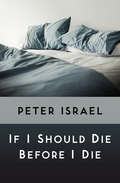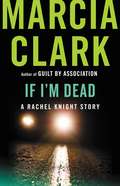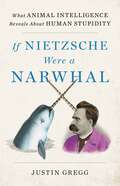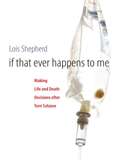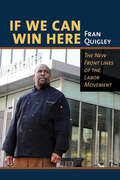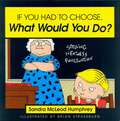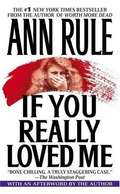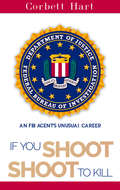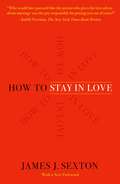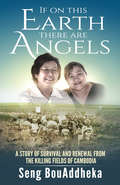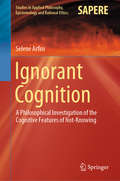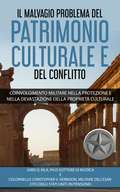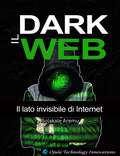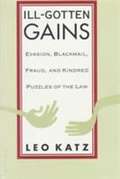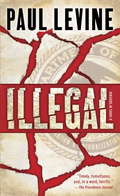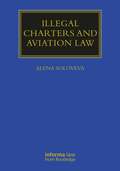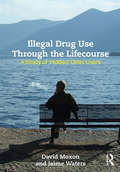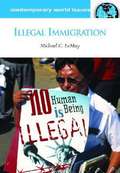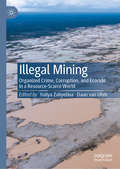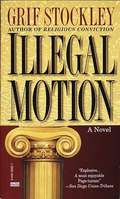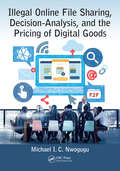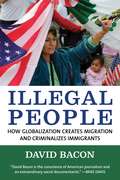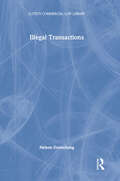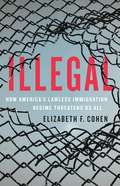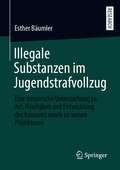- Table View
- List View
If I Should Die Before I Die
by Peter IsraelTo save his boss's wife, a clever lawyer must unmask a silent serial killer Another woman has died, just like all the others who have been targeted by the so-called pillow killer--her life snuffed out without a sound. He smothers each of them carefully, and they seem to go without struggle, as though the killer were their friend. As each new body is discovered, the women of New York come closer and closer to outright panic. Finally, one of them is about to fight back. Philip Revere is a few blocks away from his office, the stately brownstone of brilliant attorney Charles Camelot, when he sees his boss's wife sobbing outside Central Park. A sex therapist, Nora is convinced that one of her clients is the pillow killer, and she has begun to fear for her life. With Revere's help, she will do whatever it takes to put the culprit behind bars.
If I'm Dead: A Rachel Knight Story (A Rachel Knight Novel)
by Marcia ClarkIt started with a haunting image: a Ford Explorer, iridiscent in the moonlight and alone on a desolate stretch of beach. Its owner, Melissa Gibbons, has gone missing. Her husband says she flew the coop. But Los Angeles Deputy DA Rachel Knight is convinced otherwise: Melissa Gibbons has been murdered. So begins the confounding case that Rachel must present before a disbelieving jury. A dissatisfied heiress and her philandering husband-- what really happened? The husband has a fiendishly convincing case that Melissa faked her own death and fled. But with the support of her trusty sidekick, Detective Bailey Keller, Rachel pieces together a much more sinister truth. In this short, standalone Rachel Knight thriller, readers follow our savvy and riotiously entertaining heroine through the surprising world of LA crime.
If Nietzsche Were a Narwhal: What Animal Intelligence Reveals About Human Stupidity
by Justin GreggThis funny, "extraordinary and thought-provoking" (The Wall Street Journal) book asks whether we are in fact the superior species. As it turns out, the truth is stranger—and far more interesting—than we have been led to believe.If Nietzsche Were a Narwhal overturns everything we thought we knew about human intelligence, and asks the question: would humans be better off as narwhals? Or some other, less brainy species? There&’s a good argument to be made that humans might be a less successful animal species precisely because of our amazing, complex intelligence. All our unique gifts like language, math, and science do not make us happier or more &“successful&” (evolutionarily speaking) than other species. Our intelligence allowed us to split the atom, but we&’ve harnessed that knowledge to make machines of war. We are uniquely susceptible to bullshit (though, cuttlefish may be the best liars in the animal kingdom); our bizarre obsession with lawns has contributed to the growing threat of climate change; we are sexually diverse like many species yet stand apart as homophobic; and discriminate among our own as if its natural, which it certainly is not. Is our intelligence more of a curse than a gift? As scientist Justin Gregg persuasively argues, there&’s an evolutionary reason why human intelligence isn&’t more prevalent in the animal kingdom. Simply put, non-human animals don&’t need it to be successful. And, miraculously, their success arrives without the added baggage of destroying themselves and the planet in the process. In seven mind-bending and hilarious chapters, Gregg highlights one feature seemingly unique to humans—our use of language, our rationality, our moral systems, our so-called sophisticated consciousness—and compares it to our animal brethren. Along the way, remarkable tales of animal smarts emerge, as you&’ll discover: &“A dazzling, delightful read on what animal cognition can teach us about our own mental shortcomings.&” —Adam Grant The house cat who&’s better at picking winning stocks than actual fund managers Elephants who love to drink Pigeons who are better than radiologists at spotting cancerous tissue Bumblebees who are geniuses at teaching each other soccer What emerges is both demystifying and remarkable, and will change how you look at animals, humans, and the meaning of life itself. San Francisco Chronicle bestseller • BOOKRIOT Best Books of the Year • Next Big Idea Book Club Best Science Books of the Year &“I love the book, and everyone should read it.&” —Ryan Holiday "Undeniably entertaining." —TheNew York Times
If That Ever Happens to Me: Making Life and Death Decisions after Terri Schiavo
by Lois ShepherdEvery day, thousands of people quietly face decisions as agonizing as those made famous in the Terri Schiavo case. Throughout that controversy, all kinds of people--politicians, religious leaders, legal and medical experts--made emphatic statements about the facts and offered even more certain opinions about what should be done. To many, courts were either ordering Terri's death by starvation or vindicating her constitutional rights. Both sides called for simple answers. If That Ever Happens to Medetails why these simple answers were not right for Terri Schiavo and why they are not right for end-of-life decisions today. Lois Shepherd looks behind labels like "starvation," "care," or "medical treatment" to consider what care and feeding really mean, when feeding tubes might be removed, and why disability groups, the faithful, and even the dying themselves often suggest end-of-life solutions that they might later regret. For example, Shepherd cautions against living wills as a pat answer. She provides evidence that demanding letter-perfect documents can actually weaken, rather than bolster, patient choice. The actions taken and decisions made during Terri Schiavo's final years will continue to have repercussions for thousands of others--those nearing death, their families, health-care professionals, attorneys, lawmakers, clergy, media, researchers, and ethicists. If That Ever Happens to Meis an excellent choice for anyone interested in end-of-life law, policy, and ethics--particularly readers seeking a deeper understanding of the issues raised by Terri Schiavo's case.
If We Can Win Here: The New Front Lines of the Labor Movement
by Fran QuigleyDo service-sector workers represent the future of the U.S. labor movement? Mid-twentieth-century union activism transformed manufacturing jobs from backbreaking, low-wage work into careers that allowed workers to buy homes and send their kids to college. Some union activists insist that there is no reason why service-sector workers cannot follow that same path. In If We Can Win Here, Fran Quigley tells the stories of janitors, fry cooks, and health care aides trying to fight their way to middle-class incomes in Indianapolis. He also chronicles the struggles of the union organizers with whom the workers have made common cause. The service-sector workers of Indianapolis mirror the city's demographics: they are white, African American, and Latino. In contrast, the union organizers are mostly white and younger than the workers they help rally. Quigley chronicles these allies' setbacks, victories, bonds, and conflicts while placing their journey in the broader context of the global economy and labor history. As one Indiana-based organizer says of the struggle being waged in a state that has earned a reputation as antiunion: "If we can win here, we can win anywhere." The outcome of the battle of Indianapolis may foretell the fate of workers across the United States.
If You Had to Choose, What Would You Do?
by Sandra Mcleod HumphreyIs is wrong to sneak into the movies if your big brother says it's okay? If "everybody" is cheating on the math test, shouldn't you, too? What if telling the truth gets your best friend in trouble?It's never too early for us to begin talking to our children about values and helping them define and clarify their code of moral conduct. This is a great way for them to build self-confidence in their ability to work through everyday problems! The 25 situations presented here and the thought-provoking questions at the end of each scenario have been developed to help you talk to your child about social and moral issues in a natural and nonthreatening way. What an entertaining way to learn vital life skills!
If You Really Loved Me: A True Story of Desire and Murder
by Ann RuleDavid Brown, a self-made millionaire by the age of thirty-two, had a seemingly perfect life: a lucrative business, a beautiful young wife and a daughter who loved him very much. His life changed drastically after his wife was shot to death while she slept in their home and his then fourteen-year old daughter Cinnamon confessed to the cold-blooded murder. She was sentenced to twenty-four years to life for the crime. It wasn’t until two lawyers started digging into the complex investigation shortly before Cinnamon was convicted that the true nature of David Brown was revealed and startling new evidence that showed his twisted and perverse personal life was brought to the case. Was David Brown the bland, desolate widower he seemed to be? Or did he use manipulative tactics against the women who loved and feared him?
If You Shoot, Shoot To Kill
by Corbett HartThis is the professional autobiography of a Special Agent of the FBI segmented into twenty cases in which he was largely instrumental in bringing to completion. They range from white collar criminals attempting to swindle Elvis Presley to desperados such as Billy Dean Anderson, Danny Owens and an assortment of nefarious criminals including, but not limited to swindlers, bank robbers, murderers, and an untrue wife negotiating for her husband’s assassination.
If You're in My Office, It's Already Too Late: A Divorce Lawyer's Guide to Staying Together
by James J. SextonHard-hitting divorce lawyer James Sexton shares his insights and wisdom from the front lines of divorce to keep you out of his office and improve your relationship.If You're in My Office, It's Already Too Late. James Sexton knows this. After dealing with more than a thousand clients whose marriages have dissolved over everything from an ill-advised threesome with the nanny to the uneven division of carpool duties, he also knows all of the what-not-to-dos for couples who want to build—and consistently work to preserve—a lasting, fulfilling relationship. Described by former clients as a “courtroom gunslinger” and “the sociopath you want on your side,” Sexton tells the unvarnished truth about relationships, diving straight into the most common marital problems. These usually derive from dishonest—or nonexistent—communication. Even when the alleged reason for separation is one spouse’s new “personal trainer,” there’s likely a communication problem that predates the fitness kick. Symptom and root cause get confused all the time.Sexton has spent his career working with spouses-to-be-no-longer. Reverse engineering a relationship can help to identify and fix what does not work. Ever feel like you’re holding back criticism of your spouse because you just can’t have that fight right now? Sexton will tell you to “Hit Send Now.” Maybe you aren’t as adventurous as you used to be, or need some "you time," but for some reason it seems weird or exhausting to change up the routine now. Sexton knows where that mentality leads and offers viable alternative paths to take. Though he deals constantly with the heartbreak of others, he still believes in romance and the transformative power of love. This book is his opportunity to use what he has learned to help couples that aren’t so far gone get back on track.
If on this Earth there are Angels: A story of survival and renewal from the Killing Fields of Cambodia
by Seng BouaddhekaIn April 1975, Addheka was a 14-year-old Cambodian girl who had only just learned to walk after being a polio victim as an infant. She was part of the forced evacuation from Phnom Penh of the entire population of the city and trudged to an unknown future with her large extended family Her beloved father, who produced two other families, altogether looked after 24 children and three wives. The families were soon scattered far and wide and lost touch with each other. The brutal, apocalyptic reality of the Pol Pot regime soon hit home, with devastating consequences for her family. For much of the next four years Addheka was alone, surviving unusual hardship and witnessing the fanatical, irrational, murderous reality of the Khmer Rouge regime. When it all ended, Addheka eventually returned to Phnom Penh to find out which of her family members had survived. She remained in Cambodia and became part of the reconstruction effort, working in a major hospital, then becoming a language teacher and Principal. She underwent a spiritual renewal and today runs the Aid Projects of Mercy for the very poorest children in Cambodia.
Ignorant Cognition: A Philosophical Investigation of the Cognitive Features of Not-Knowing (Studies in Applied Philosophy, Epistemology and Rational Ethics #46)
by Selene ArfiniThis book offers a comprehensive philosophical investigation of ignorance. Using a set of cognitive tools and models, it discusses features that can describe a state of ignorance if linked to a particular type of cognition affecting the agent’s social behavior, belief system, and inferential capacity. The author defines ignorance as a cognitive condition that can be either passively (and unconsciously) borne by an agent or actively nurtured by him or her, and a condition that entails epistemic limitations (which can be any lack of knowledge, belief, information or data) that affect the agent’s behavior, belief system, and inferential capacity.The author subsequently describes the ephemeral nature of ignorance, its tenacity in the development of human inferential and cognitive performance, and the possibility of sharing ignorance among human agents within the social dimension. By combining previous frameworks such as the naturalization of logic, the eco-cognitive perspective in philosophy and concepts from Peircean epistemology, and adding original ideas derived from the author’s own research and reflections, the book develops a new cognitive framework to help understand the nature of ignorance and its influence on the human condition.
Il Malvagio Problema Del Patrimonio Culturale E Del Conflitto: Coinvolgimento militare nella protezione e nella devastazione della Proprietà Culturale
by Joris D. Kila e Christopher V. HerndonL'eredità culturale del mondo è attualmente minacciata non solo dal tempo, dalla natura, e dallo sviluppo umano e anche dal l'aumentare dei conflitti armati. Vediamo le distruzioni causate dal saccheggio e dal traffico illecito ma anche l'iconoclastia e le manipolazioni dell'eredità culturale per motivi politici, religiosi, economici, e di propaganda. I ricavi derivati dalla vendita illecita sono spesso usati per finanziare i conflitti come illustrato nell'esempio del modello finanziario di Da'esh in questo libro. La Protezione del Patrimonio Culturale (CPP), anche se legalmente obbligatoria secondo la legge nazionale e internazionale, è mal implementata e le sanzioni sono raramente applicate. C'è però, una richiesta costante e internazionale per l'educazione e i risultati della ricerca multidisciplinare sull'argomento, specialmente nel contesto del conflitto e del crimine. Le ricerche devono includere le prospettive militari, e i meccanismi comuni collegati all’abuso e alla protezione. I risultati devono contenere concettualizzazioni accademiche, nonchè soluzioni basate sulla pratica per diminuire e mitigare i danni. Per soddisfare le richieste mentre si espandono, a seguito del loro lavoro precedente ne il Coinvolgimento Militare nella Protezione del Patrimonio Culturale: Una Panoramica (Forza Congiunta Trimestrale, JFQ 74 Joint Force Quarterly, Terzo Trimestre 2014 Luglio 2014) gli autori hanno scritto questa pubblicazione. Contiene una selezione di esempi in materia e incorpora recenti sviluppi e tendenze. Tutti gli ingredienti servono per alimentare la ricerca e il dialogo sull’uso e l’abuso dell’eredità culturale specialmente nell’evento di un conflitto, con particolare riguardo sulla cooperazione e la coordinazione tra i soggetti interessati e le parti militari. Una selezione di identificati problemi fondamentali della CPP sono disucsse come parte di un’analisi di comparazione con esempi in materia come il caso Dugongo,
Il Dark Web: Il lato invisibile di Internet
by Bolakale AremuQuesto è il libro relativo al Dark Web e alla Dark Net attualmente più aggiornato. Se volete conoscere o intraprendere il viaggio sul Dark Web, non potete non leggere questo libro. Conoscerete i fondamenti, i fatti e le cifre del Surface Web (Web in superficie), del Deep Web (Web in profondità) e del Dark Web. Il libro fornisce un'ampia panoramica delle minacce digitali e dei crimini informatici attuali ed emergenti. Verrete aggiornati con informazioni essenziali sulle frodi e sui furti di identità perpetrati quotidianamente nel Dark Web. Nello specifico scoprirete: • Che cos'è esattamente il Dark Web? • Le origini del Deep Web e del Dark Web. • Le attività che hanno luogo nel Dark Web. • In che modo il Dark Web vi riguarda. • Come vengono venduti i dati personali sul Dark Web. • I dati venduti più spesso sul Dark Web. • Traffico di organi umani e servizi di pedopornografia sul Dark Web. • I mercati del Dark Web. • La rete Tor e il funzionamento del browser Tor. • La storia di Ross William Ulbricht, l'uomo dietro la Silk Road (Via della Seta). • La verità sul Surface Web: perché non ci si può fidare di alcuni siti per quanto riguarda i propri dati. Le cose più importanti che imparerete: • Cosa potete fare per proteggervi dalle attività criminali del Dark Web. • Come mantenere la vostra identità al sicuro su Internet ogni giorno.
Ill-Gotten Gains: Evasion, Blackmail, Fraud, and Kindred Puzzles of the Law
by Leo KatzLeo Katz describes the underlying principles that not only guide the law but also moral decisions. Mixing wit with insight, anecdotes with analysis, Katz uncovers what is really at stake in crimes such as insider trading, blackmail, and plagiarism.
Illegal
by Paul LevineThe Edgar-nominated author acclaimed for clever writing and crackling courtroom scenes delivers a vividly realized thriller about a disgraced lawyer traveling the twisted border between justice and revenge in a desperate bid to clear his name.
Illegal Charters and Aviation Law (Maritime and Transport Law Library)
by Alena SolovevaThis book concerns the subject of illegal charters. The risks associated with illegal charters are high, and the consequences are dire and different for all the parties involved. Pilots can lose their hard-earned licenses, aircraft owners might not get paid by the insurance companies, businesses might be prosecuted and fined, customers do not get what they paid for. The worst consequence of an illegal charter is that someone gets hurt or killed. The tragic part in reading about a flight accident is the understanding that an illegal charter could have been avoided. The present book aims to fulfil the industry’s call for greater awareness, education, and transparency. It will systematically and thoroughly investigate the application of law in a practical context of illegal charters. It engages in a comprehensive comparative study across various jurisdictions, such as the USA, Europe, Russia, Asia and the Middle East. This text considers whether the elements evidencing state practice in regulation of illegal charters are peculiar to the region and legal system. It examines how illegal charters can be prevented and undertakes the analysis of risks and consequences of illegal charters. This is an important book that is likely to have a significant impact on existing scholarship regarding international and national aviation law and be of interest of all parties involved in aviation. This includes industry professionals, legal practitioners, academics, policy-makers, and government officials.
Illegal Drug Use Through The Lifecourse: A Study Of 'Hidden' Older Users
by Jaime Waters David MoxonHidden older illegal drug users are a seldom researched group; most research on illegal drug users instead focusses on the young or the institutionalised. To counter this trend, this book reports on a study of current 'hidden' users of illegal drugs aged 40 and over. These are individuals who have sustained illegal drug use over the long term, largely away from the gaze of the authorities, whilst living otherwise 'conventional' lives, holding down jobs, raising families and so on. Thus they have much to tell us about how illegal substances can be integrated into life over the long term, how that integration intersects with other aspects of one's existence, and how illegal drug use is ultimately shaped by changes in personal circumstances and wider social contexts. Utilising insights from the 'life course perspective', the development of the participants' use over their lives is analysed and placed in social context. The book also details the nature of their current drug use. Thus, the book illustrates the place of illegal drugs in the lives of the participants, and how this came to be over the decades as they also juggled work, family and the everyday minutiae of life with their use. The result is a unique look at the illegal drug use of an often ignored group of older drug users, which charts the changing role that illegal drugs have played - and continue to play - in their lives.
Illegal Immigration
by Mildred Vasan Michael LemayThis book examines the flow of unauthorized immigration to the US, primarily since 1970, and the reactions in and consequences of legal immigration policy. LeMay (political science, social and behavioral sciences, California State University--San Bernardino, emeritus) ultimately takes his discussion of immigration into the context of globalization. The volume includes a chronology, directory of organizations involved in immigration policy-making, a list of resources, and biographical sketches of the major players in illegal immigration policy matters.
Illegal Mining: Organized Crime, Corruption, and Ecocide in a Resource-Scarce World
by Daan Van Uhm Yuliya ZabyelinaThis book provides a comprehensive analysis of the illegal extraction of metals and minerals from the perspectives of organized crime theory, green criminology, anti-corruption studies, and victimology. It includes contributions that focus on organized crime-related offences, such as drug trafficking and trafficking in persons, extortion, corruption and money laundering and sheds light on the serious environmental harms caused by illegal mining. Based on a wide range of case studies from the Amazon rainforest through the Ukrainian flatlands to the desert-like savanna of Central African Republic and Australia’s elevated plateaus, this book offers a unique insight into the illegal mining business and the complex relationship between organized crime, corruption, and ecocide. This is the first book-length publication on illegal extraction, trafficking in mined commodities, and ecocide associated with mining. It will appeal to scholars working on organized crime and green crime, including criminologists, sociologists, anthropologists, and legal scholars. Practitioners and the general public may welcome this comprehensive and timely publication to contemplate on resource-scarcity, security, and crime in a rapidly changing world.
Illegal Motion (Gideon Page #4)
by Grif StockleyArkansas attorney Gideon Page has no idea what's in store for him when he agrees to defend Dade Cunningham, the Razorback's star receiver, against a charge of rape.
Illegal Online File Sharing, Decision-Analysis, and the Pricing of Digital Goods
by Michael I. NwoguguIllegal online file sharing costs companies tens of billions of dollars of lost revenues around the world annually and results in lost productivity, various psychological issues, and significant reduction of incentives to create and innovate. Legislative, technical, and enforcement efforts have failed. This book presents psychological theories about why people illegally share files online; analyzes and characterizes optimal sanctions for illegal online file sharing; introduces new models for pricing of network-access and digital-content to help reduce illegal online file sharing; introduces new content control and P2P systems; and explains why game theory does not work in pricing of network access.
Illegal People: How Globalization Creates Migration and Criminalizes Immigrants
by David BaconFor two decades veteran photojournalist David Bacon has documented the connections between labor, migration, and the global economy. In Illegal People Bacon explores the human side of globalization, exposing the many ways it uproots people in Latin America and Asia, driving them to migrate. At the same time, U. S. immigration policy makes the labor of those displaced people a crime in the United States. Illegal People explains why our national policy produces even more displacement, more migration, more immigration raids, and a more divided, polarized society. Through interviews and on-the-spot reporting from both impoverished communities abroad and American immigrant workplaces and neighborhoods, Bacon shows how the United States' trade and economic policy abroad, in seeking to create a favorable investment climate for large corporations, creates conditions to displace communities and set migration into motion. Trade policy and immigration are intimately linked, Bacon argues, and are, in fact, elements of a single economic system. In particular, he analyzes NAFTA's corporate tilt as a cause of displacement and migration from Mexico and shows how criminalizing immigrant labor benefits employers. For example, Bacon explains that, pre-NAFTA, Oaxacan corn farmers received subsidies for their crops. State-owned CONASUPO markets turned the corn into tortillas and sold them, along with milk and other basic foodstuffs, at low, subsidized prices in cities. Post-NAFTA, several things happened: the Mexican government was forced to end its subsidies for corn, which meant that farmers couldn't afford to produce it; the CONASUPO system was dissolved; and cheap U. S. corn flooded the Mexican market, driving the price of corn sharply down. Because Oaxacan farming families can't sell enough corn to buy food and supplies, many thousands migrate every year, making the perilous journey over the border into the United States only to be labeled "illegal" and to find that working itself has become, for them, a crime. Bacon powerfully traces the development of illegal status back to slavery and shows the human cost of treating the indispensable labor of millions of migrants-and the migrants themselves-as illegal. Illegal People argues for a sea change in the way we think, debate, and legislate around issues of migration and globalization, making a compelling case for why we need to consider immigration and migration from a globalized human rights perspective.
Illegal Transactions (Lloyd's Commercial Law Library)
by Nelson EnonchongConcerned with the area of illegal transactions, this text addresses practical issues, for example: who can raise the issue of illegality?; must illegality be pleaded? And when can a party recover money or property transferred pursuant to an illegal transaction? Divided into three main sections the text: deals with illegality as a defence to claims in various departments of the civil law; and examines the forfeiture rule as a tool which one party could compel another to disgorge profits which the other has acquired or would otherwise acquire from his illegal conduct. The third section of the text discusses the circumstances when, by way of exception, the court will enforce the claim of a person even though that person has been guilty of an illegality. Overall the text provides an account of the illegalities in civil law and a critical analysis of the current rules, with suggestions for reform.
Illegal: How America's Lawless Immigration Regime Threatens Us All
by Elizabeth F. CohenA political scientist explains how the American immigration system ran off the rails -- and proposes a bold plan for reform Under the Trump administration, US immigration agencies terrorize the undocumented, target people who are here legally, and even threaten the constitutional rights of American citizens. How did we get to this point? In Illegal, Elizabeth F. Cohen reveals that our current crisis has roots in early twentieth century white nationalist politics, which began to reemerge in the 1980s. Since then, ICE and CBP have acquired bigger budgets and more power than any other law enforcement agency. Now, Trump has unleashed them. If we want to reverse the rising tide of abuse, Cohen argues that we must act quickly to rein in the powers of the current immigration regime and revive saner approaches based on existing law. Going beyond the headlines, Illegal makes clear that if we don't act now all of us, citizen and not, are at risk.
Illegale Substanzen im Jugendstrafvollzug: Eine empirische Untersuchung zu Art, Häufigkeit und Entwicklung des Konsums sowie zu seinen Prädiktoren
by Esther BäumlerDie vorliegende Arbeit beschäftigt sich mit dem Konsum illegaler Substanzen im Jugendstrafvollzug und zeigt auf, dass dieser dort weit verbreitet ist. Esther Bäumler gelingt es, mittels Daten aus dem DFG-geförderten Kölner Forschungsprojekt „Gewalt und Suizid unter weiblichen und männlichen Jugendstrafgefangenen“ die Entwicklung des Konsums über die Zeit der Inhaftierung hinweg nachzuverfolgen sowie erstmalig Prädiktoren für haftinternen Drogenkonsum von Jugendstrafgefangenen zu bestimmen. Daneben werden neue Befunde hinsichtlich der Konsummuster in Haft präsentiert, die auch geschlechterspezifische Unterschiede thematisieren. So wird auch der bisher unbeachteten Gruppe der weiblichen Jugendstrafgefangenen Aufmerksamkeit gewidmet. Die Autorin Esther Bäumler studierte Rechtswissenschaften an der Universität zu Köln mit dem Schwerpunkt Kriminologie, Jugendkriminalrecht und Strafvollzug. Nach dem ersten Staatsexamen arbeitete sie als wissenschaftliche Mitarbeiterin am Institut für Kriminologie der Universität zu Köln und wurde bei Prof. Dr. Neubacher M. A. promoviert. Derzeit absolviert sie ihr Rechtsreferendariat am Landgericht Aachen.
